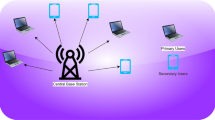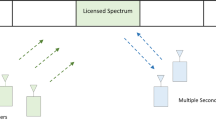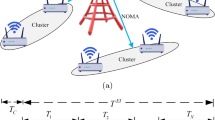Abstract
Cooperative spectrum sensing (CSS) has been considered as an essential paradigm of cognitive radio (CR) to provide ever-growing wireless applications with the available spectrum band. However, the following problems degrade the security and efficiency of CSS in cognitive radio networks (CRNs), such as, (i) the open facet of the CRN provides an opportunity for the Byzantine attacker to falsify the sensing information, (ii) imperfect reporting channels may distort the sensing information during the decision-making process, (iii) a large amount of sensing information transmission incurs communication overhead. Confronting these problems, we propose a secure and efficient CSS scheme, called generalized voting-sequential and differential reporting (GV-SDR) in this paper. For this aim, we first design a data transmission monitoring process in the periodic spectrum sensing frame structure to defend against Byzantine attack. Furthermore, we exploit the on/off signaling characteristic and propose a single signaling transmission method to mitigate the negative impact of the imperfect reporting channel. Moreover, based on the generalized voting (GV) rule, the sensing information fusion is carried out in the sequential and differential reporting (SDR) mechanism to improve the spectrum sensing efficiency. Simulation results show that in front of Byzantine attack and imperfect reporting channels, the proposed GV-SDR not only significantly reduces the sensing information required by the FC, but also provides the better detection performance.













Similar content being viewed by others
References
Ahmad, W. S. H. M. W., Radzi, N. A. M., Samidi, F. S., Ismail, A., Abdullah, F., Jamaludin, M. Z., & Zakaria, M. N. (2020). 5G technology: Towards dynamic spectrum sharing using cognitive radio networks. IEEE Access, 8, 14460–14488.
Kakkavas, G., Tsitseklis, K., Karyotis, V., & Papavassiliou, S. (2020). A software defined radio cross-layer resource allocation approach for cognitive radio networks: From theory to practice. IEEE Transactions on Cognitive Communications and Networking, 6(2), 740–755.
Vaezi, A. (2020). "Cognitive radio networks: An information theoretic perspective". arXiv preprint arXiv:2001.09261.
Zhao, Y., Zhou, B., Saad, W., & Luo, X. (2019). Age of information analysis for dynamic spectrum sharing. In IEEE Global Conference on Signal and Information Processing (GlobalSIP) (pp. 1–5). https://doi.org/10.1109/GlobalSIP45357.2019.8969400.
Salahdine, F., & Kaabouch, N. (2020). Security threats, detection, and countermeasures for physical layer in cognitive radio networks: A survey. Physical Communication, 39, 101001.
Ghorbel, M. B., Nam, H., & Alouini, M. S. (2013). Exact performance of cooperative spectrum sensing for cognitive radios with quantized information under imperfect reporting channels. In IEEE 78th Vehicular Technology Conference (VTC Fall) (pp. 1–5).
Ghorbel, M. B., Nam, H., & Alouini, M. S. (2014). Soft cooperative spectrum sensing performance under imperfect and non identical reporting channels. IEEE Communications Letters, 19(2), 227–230.
Wu, X., Zhang, L., & Wu, Z. (2020). Quantized soft-decision-based compressive reporting design for underlay/overlay cooperative cognitive radio networks. IEEE Transactions on Cognitive Communications and Networking, 6(3), 1044–1055.
Chaudhari, S., Lunden, J., Koivunen, V., & Poor, H. V. (2012). Cooperative sensing with imperfect reporting channels: Hard decisions or soft decisions? IEEE Transactions on Signal Processing, 60(1), 18–28.
de Souza, R. A., dos Santos Costa, L., & de Almeida, E. M. (2019). A novel decision fusion periodogram-based algorithm for centralized cooperative spectrum sensing under errors at the report channel. In 13th European Conference on Antennas and Propagation (EuCAP). Krakow, Poland (pp. 1–5).
dos Santos Costa, L., de Souza, R. A. (2020). Performance-traffic-trade-off of two novel hard decision and two soft decision fusion periodogram-based algorithms for cooperative spectrum sensing under unreliable reporting channel. IET Microwaves, Antennas & Propagation, 14(14), 1683–1695.
Lee, J. W. (2013). Cooperative spectrum sensing scheme over imperfect feedback channels. IEEE Communications Letters, 17(6), 1192–1195.
Zhao, J., Liu, Q., Wang, X., & Mao, S. (2018). Scheduling of collaborative sequential compressed sensing over wide spectrum band. IEEE/ACM Transactions on Networking, 26(1), 492–505.
Alkheir, A. A., Mouftah, H. T. (2015). "Sequential hard-decision fusion for agile cooperative spectrum sensing". In IEEE International Conference on Communication Workshop (ICCW) (pp. 1014–1019).
Bae, S., Kim, H. (2017) "ON/OFF reporting mechanism for robust cooperative sensing in cognitive IoT networks". In IEEE Wireless Communications and Networking Conference (WCNC). San Francisco (pp. 1–6).
Bae, S., & Kim, H. (2016). Robust cooperative sensing with on/off signaling over imperfect reporting channels. IEEE Transactions on Industrial Informatics, 12(6), 2196–2205.
Firouzabadi, A. D., & Rabiei, A. M. (2015). Sensing-throughput optimisation for multichannel cooperative spectrum sensing with imperfect reporting channels. IET Communications, 9(18), 2188–2196.
Li, M., Alhussein, O., Sofotasios, P. C., Muhaidat, S., Yoo, P. D., Liang, J., Wang, A. (2019). Censor-based multi-antenna cooperative spectrum sensing over erroneous feedback channels. In IEEE Wireless Communications and Networking Conference (WCNC). Marrakesh, Morocco (pp. 1–6).
Li, M., Alhussein, O., Sofotasios, P. C., Muhaidat, S., Yoo, P. D., Liang, J., & Wang, A. (2020). Censor-based cooperative multi-antenna spectrum sensing with imperfect reporting channels. IEEE Transactions on Sustainable Computing, 5(1), 48–60.
Naderipour, M., Taherpour, A., Taherpour, A., & Gazor, S. (2020). Design of optimal non-uniform quantizer in imperfect noisy reporting channels for collaborative spectrum sensing. IEEE Transactions on Vehicular Technology, 69(11), 12870–12882.
Kumar, A., Pandit, S., & Singh, G. (2020). Optimisation of censoring-based cooperative spectrum sensing approach with multiple antennas and imperfect reporting channel scenarios for cognitive radio network. IET Communications, 14(16), 2666–2676.
Kumar, A., Pandit, S., & Singh, G. (2020). Threshold selection analysis of spectrum sensing for cognitive radio network with censoring based imperfect reporting channels. Wireless Networks. https://doi.org/10.1007/s11276-020-02488-9
Ma, L., Xiang, Y., Pei, Q., Xiang, Y., & Zhu, H. (2017). Robust reputation-based cooperative spectrum sensing via imperfect common control channel. IEEE Transactions on Vehicular Technology, 67(5), 3950–3963.
Yilmaz, H. B., Tugcu, T., & Alagoz, F. (2014). Novel quantization-based spectrum sensing scheme under imperfect reporting channel and false reports. International Journal of Communication Systems, 27(10), 1459–1475.
Ahmed, A. T., López-Beníte, M., Selis, V., Patel, D. K., & Umebayashi, K. (2018). Cooperative estimation of primary traffic under imperfect spectrum sensing and Byzantine attacks. IEEE Access, 6, 61651–61664.
Fu, Y., & He, Z. (2019). Entropy-based weighted decision combining for collaborative spectrum sensing over Byzantine attack. IEEE Wireless Communications Letters, 8(6), 1528–1532.
Wu, J., Song, T., Wang, C., Hu, J. (2018). "Reputation value ranking based sequential cooperative spectrum sensing against Byzantine attack". In IEEE International Conference on Communications Workshops (ICC Workshops). Kansas City, MO (pp. 1–6).
Jun, W., Tiecheng, S., Yue, Y., Cong, W., & Jing, H. (2018). Sequential cooperative spectrum sensing in the presence of dynamic byzantine attack for mobile networks. PLoS ONE, 13(7), e0199546.
Wu, J., Song, T., Yu, Y., Wang, C., & Hu, J. (2019). Reuse of byzantine data in cooperative spectrum sensing using sequential detection. IET Communications, 14(2), 251–261.
Wu, J., Yu, Y., Song, T., & Hu, J. (2019). Sequential 0/1 for cooperative spectrum sensing in the presence of strategic Byzantine attack. IEEE Wireless Communications Letters, 8(2), 500–503.
Wu, J., Song, T., Wang, C., Yu, Y., Liu, M., Hu, J. (2017). Robust cooperative spectrum sensing against probabilistic SSDF attack in cognitive radio networks. In IEEE 86th Vehicular Technology Conference (VTC-Fall). Toronto, ON (pp. 1–6).
Wu, J., Yu, Y., Zhu, H., Song, T., & Hu, J. (2020). Cost-benefit tradeoff of Byzantine attack in cooperative spectrum sensing. IEEE Systems Journal, 14(2), 2532–2543.
Wu, J., Li, P., Chen, Y., Tang, J., Wei, C., Xia, L., & Song, T. (2020). Analysis of Byzantine attack strategy for cooperative spectrum sensing. IEEE Communications Letters, 24(8), 1631–1635.
Lo, B. F. (2011). A survey of common control channel design in cognitive radio networks. Physical Communication, 4(1), 26–39.
Luan, H., Li, O., Zhang, X. (2014). "Cooperative spectrum sensing with energy-efficient sequential decision fusion rule". In IEEE 23rd Wireless and Optical Communication Conference (WOCC) (pp. 1–4).
Wu, J., Song, T., Yu, Y., Wang, C., & Hu, J. (2018). Generalized Byzantine attack and defense in cooperative spectrum sensing for cognitive radio networks. IEEE Access, 6, 53272–53286.
Chen, R., Park, J. M. J., & Bian, K. (2012). Robustness against Byzantine failures in distributed spectrum sensing. Computer Communications, 35(17), 2115–2124.
Varshney, P. K. (2012). Distributed detection and data fusion. Springer Science & Business Media.
Funding
Open Research Fund of National Mobile Communications Research Laboratory, Southeast University (No. 2022D16), Fundamental Research Funds for the Provincial Universities of Zhejiang (No. GK209907299001-023), Open Fund Project of Sichuan Provincial Key Laboratory of Artificial Intelligence (No. 2021RYJ07), and 2020 Annual Teachers' Professional Development Project of Domestical Visiting Scholars in Institutions of Higher Education (No. FX2020009).
Author information
Authors and Affiliations
Corresponding author
Additional information
Publisher's Note
Springer Nature remains neutral with regard to jurisdictional claims in published maps and institutional affiliations.
Rights and permissions
About this article
Cite this article
Wu, J., Chen, Z. Secure and efficient cooperative spectrum sensing under byzantine attack and imperfect reporting channel. Wireless Netw 28, 367–380 (2022). https://doi.org/10.1007/s11276-021-02853-2
Accepted:
Published:
Issue Date:
DOI: https://doi.org/10.1007/s11276-021-02853-2




